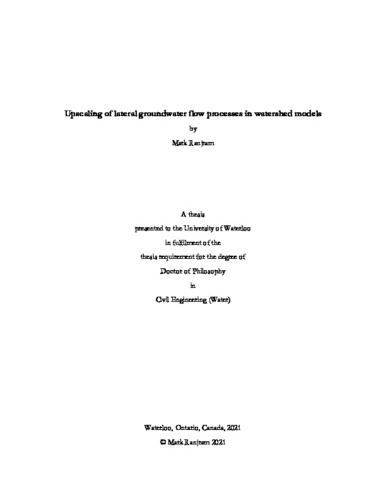| dc.contributor.author | Ranjram, Mark | |
| dc.date.accessioned | 2021-12-14 20:13:05 (GMT) | |
| dc.date.available | 2021-12-14 20:13:05 (GMT) | |
| dc.date.issued | 2021-12-14 | |
| dc.date.submitted | 2021-12-02 | |
| dc.identifier.uri | http://hdl.handle.net/10012/17758 | |
| dc.description.abstract | Hydrologic models are essential tools for hydrologists and water resources engineers. However, there is a critical gap between our knowledge of the appropriate model representation of physical processes at the point scale and at the watershed scale. Due to the ubiquitous presence of heterogeneity, this scale disconnect can have significant implications for practical watershed modelling. Closing this gap requires the identification and implementation of appropriate upscaling approaches. Upscaling refers to the derivation of relationships which translate small scale process descriptions into constitutive relationships that are applicable at larger scales. While several approaches in the literature have been successful in generating such relations for vertical flow (i.e., laterally independent) processes, such as infiltration or evapotranspiration, attempts to address lateral flow processes have been limited.
This work establishes upscaling relationships and identifies critical watershed-scale landform controls for lateral subsurface stormflow, being the lateral transfer of water through the saturated subsurface of a hillslope into a surface water network during a recharge event. This work also establishes a novel and comprehensive literature review synthesizing decades of applied upscaling work in the hydrology literature. This review is intended to provide a practical starting point for future research into upscaling approaches in computational hydrology.
Subsurface stormflow is here characterized by the hillslope-storage Boussinesq (hsB) equation at the hillslope scale, and manifests as an aggregate recession curve at the basin sale. A surrogate model developed herein, the hsB Proxy, rapidly provides high-quality approximate solutions to this non-linear governing equation, and thus enables the application of the equation across 50 basins composed of hundreds of hillslopes. Upscaling relationships are generated from the aggregate recession behaviour in these basins in response to a recharge time series. This work describes the development of the hsB proxy, and the associated development of novel upscaling relationships that capably reproduce the aggregate recession behaviour of a basin in response to a recharge time series, using only the distribution of hillslope-scale properties as input. The insights thus generated provide a new, explicit connection between the topographic characteristics of a basin, the history and magnitude of recharge, and the large-scale recession response. These relationships allow hydrologic models to include the insights of detailed hillslope drainage physics without the associated computational cost. | en |
| dc.language.iso | en | en |
| dc.publisher | University of Waterloo | en |
| dc.subject | upscaling | en |
| dc.subject | groundwater | en |
| dc.subject | hydrology | en |
| dc.subject | hillslopes | en |
| dc.subject | subsurface stormflow | en |
| dc.subject | basin recession | en |
| dc.subject | Boussinesq | en |
| dc.title | Upscaling of lateral groundwater flow processes in watershed models | en |
| dc.type | Doctoral Thesis | en |
| dc.pending | false | |
| uws-etd.degree.department | Civil and Environmental Engineering | en |
| uws-etd.degree.discipline | Civil Engineering (Water) | en |
| uws-etd.degree.grantor | University of Waterloo | en |
| uws-etd.degree | Doctor of Philosophy | en |
| uws-etd.embargo.terms | 0 | en |
| uws.contributor.advisor | Craig, James R. | |
| uws.contributor.affiliation1 | Faculty of Engineering | en |
| uws.published.city | Waterloo | en |
| uws.published.country | Canada | en |
| uws.published.province | Ontario | en |
| uws.typeOfResource | Text | en |
| uws.peerReviewStatus | Unreviewed | en |
| uws.scholarLevel | Graduate | en |

